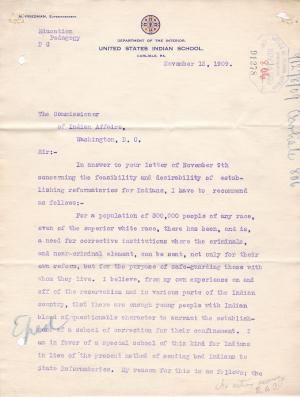Acting Commissioner of Indian Affairs F. H. Abbott asks Carlisle Indian School Superintendent Moses Friedman for his opinion regarding converting one of the current Indian schools into a "reform" school for students who are "incorrigible and persistently immoral." Abbot's hope is that the schools would be especially intense and that the establishment of such a school would do away with the need for guardhouses at other schools.
Friedman states that he does think such a school should exist, and that "corrective institutions" have to exist for any race, even "the superior white race," and that separating "bad Indians" from white and black criminals, would mean the Indians were more likely to be reformed. He continues on to say that this institution should not be associated with Indian schools, which should handle their own discipline, but should instead be for all Indians. He believes that their should be separate institutions for males and females though.
Friedman states that he is against corporal punishment, that the Indian Service should take a stance against or abolish corporal punishment, and that Superintendents that "abuse" their punitive powers against students should be held accountable. Finally, he's concerned about the legality of "imprisoning" an Indian student, who voluntarily consented to going to a school, without "due process of law."

